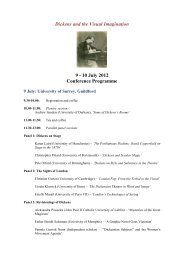The targeted killing of terrorists on foreign soil - Institute of Advanced ...
The targeted killing of terrorists on foreign soil - Institute of Advanced ...
The targeted killing of terrorists on foreign soil - Institute of Advanced ...
You also want an ePaper? Increase the reach of your titles
YUMPU automatically turns print PDFs into web optimized ePapers that Google loves.
Tobias Ruettersh<str<strong>on</strong>g>of</str<strong>on</strong>g>f<br />
Panel 4 (a)<br />
Finally, even the argument <str<strong>on</strong>g>of</str<strong>on</strong>g> ‘named <str<strong>on</strong>g>killing</str<strong>on</strong>g>’ can be invalidated. On the <strong>on</strong>e hand, it has the<br />
permissive moral premise that soldiers can (morally) be killed in war, regardless <str<strong>on</strong>g>of</str<strong>on</strong>g> their<br />
individual innocence but <strong>on</strong> the other hand, its c<strong>on</strong>clusi<strong>on</strong> is very restrictive in the sense that<br />
even actors who are not innocent (either morally or materially) are illegitimate targets. This<br />
is quite paradoxical but results from the collectivist soluti<strong>on</strong> to the problem <str<strong>on</strong>g>of</str<strong>on</strong>g> <str<strong>on</strong>g>killing</str<strong>on</strong>g> in<br />
wartime. If self-defence does not provide ample justificati<strong>on</strong> for <str<strong>on</strong>g>killing</str<strong>on</strong>g>s in war, then it must<br />
be c<strong>on</strong>cluded that these <str<strong>on</strong>g>killing</str<strong>on</strong>g>s are morally unjustified and, therefore, war in general is<br />
unjustified. Seeing people killed in war as agents <str<strong>on</strong>g>of</str<strong>on</strong>g> a state rather than as individuals is thus<br />
not helpful, because their moral dignity is not c<strong>on</strong>tingent to a certain status (see Statman<br />
2004, 190). Furthermore, targeting <str<strong>on</strong>g>terrorists</str<strong>on</strong>g> does not mean <str<strong>on</strong>g>killing</str<strong>on</strong>g> them by name, but by<br />
role. Terrorists are <str<strong>on</strong>g>targeted</str<strong>on</strong>g> for the special role they play in a terrorist organisati<strong>on</strong> and for<br />
the acti<strong>on</strong>s they committed. This is similar to <str<strong>on</strong>g>killing</str<strong>on</strong>g>s in c<strong>on</strong>venti<strong>on</strong>al wars, where agents in a<br />
prominent positi<strong>on</strong> such as generals or military leaders are more preferentially <str<strong>on</strong>g>targeted</str<strong>on</strong>g> by<br />
the enemy. <str<strong>on</strong>g>The</str<strong>on</strong>g>se targetings show no “pers<strong>on</strong>al” grievance, but simply mean the recogniti<strong>on</strong><br />
<str<strong>on</strong>g>of</str<strong>on</strong>g> their special positi<strong>on</strong> in their role as agents (ibid., 190).<br />
To sum up, there are certainly str<strong>on</strong>g arguments for and against the legitimacy <str<strong>on</strong>g>of</str<strong>on</strong>g> <str<strong>on</strong>g>targeted</str<strong>on</strong>g><br />
<str<strong>on</strong>g>killing</str<strong>on</strong>g>. Even though the negative side seems to be overwhelming at first, it can be<br />
invalidated by the positive aspects. In particular the fact that <str<strong>on</strong>g>targeted</str<strong>on</strong>g> <str<strong>on</strong>g>killing</str<strong>on</strong>g> has a str<strong>on</strong>g<br />
deterrent potential (if used correctly and not excessively) and keeps <str<strong>on</strong>g>terrorists</str<strong>on</strong>g> <strong>on</strong> the run,<br />
alienating them from society is a str<strong>on</strong>g argument for it. However, they <strong>on</strong>ly c<strong>on</strong>cern the<br />
‘input’ side <str<strong>on</strong>g>of</str<strong>on</strong>g> legitimacy and the ‘output’ side, or effectiveness needs to be assessed as well.<br />
4.2 Effectiveness<br />
Some literature <strong>on</strong> <str<strong>on</strong>g>targeted</str<strong>on</strong>g> <str<strong>on</strong>g>killing</str<strong>on</strong>g> suggests that this policy diminishes the coercive and<br />
operati<strong>on</strong>al capabilities <str<strong>on</strong>g>of</str<strong>on</strong>g> terrorist organisati<strong>on</strong>s in several ways (see e.g. David 2002, 6;<br />
Byman 2006, 101 f.; Blum/Heymann 2010, 166 f.). <str<strong>on</strong>g>The</str<strong>on</strong>g> c<strong>on</strong>stant targeting <str<strong>on</strong>g>of</str<strong>on</strong>g> key leaders<br />
significantly disrupts an organisati<strong>on</strong> and leaves it in general disarray. Even in decentralised<br />
organisati<strong>on</strong>s such as Al-Qaeda, skilled and experienced leaders are rare and difficult to<br />
replace, particularly in the short-term (see Cullen 2007, 8). In Afghanistan, the US Army has<br />
observed that “in several cases, insurgents have actually refused to take over the leadership<br />
positi<strong>on</strong>s, have had difficulty finding technical experts, such as IED (Improvised Explosive<br />
Device) facilitators, gun runners and bomb trainers” (Brook 2011). By removing <str<strong>on</strong>g>terrorists</str<strong>on</strong>g> in<br />
leadership positi<strong>on</strong>s, the ability to coordinate attacks is substantially disrupted and the<br />
communicati<strong>on</strong> between leaders and operators breaks down, which complicates both shortterm<br />
tactical planning and l<strong>on</strong>g-term strategic planning (see Wilner 2010, 312).<br />
- 26 -
















